Diablo 2 (2000) review | PC Gamer - wilmoredieve1974
Our Verdict
Life-suckingly persuasive trinket-gathering fulfill with surprising depth.
PC Gamer Finding of fact
Life-suckingly compelling trinket-gathering action with surprising profoundness.
To mark the launch of Diablo 2: Resurrected, we're publishing our original limited review of Diablo 2. This review ran in Personal computer Gamer UK issue 86 in September 2000. We're working along a fresh go over of Diablo 2: Resurrected now the gamey is live, and you can regain Fraser's impressions here .
My arm hurts. And while there are some things I want to say about Diablo II which are not by a long sight in its prefer, my criticisms ultimately count for nothing when set against that pervasive muscular ache. Although I will call it repetitive and corny, claim that it encourages inelegant play, and curse its fetishistic immaturity, the plain, painful fact is that Diablo II is the about savagely addictive game I've played since Half life. It devours clock time. You sit downhearted for a quick play—just to find the next keep, you Tell yourself; just to get your bearings in the next section—then you regain awareness with the alarm time ringing from the bedroom and an arm so tensed from all-night black eye-clicking that it barely feels part of you whatsoever more.
The gage's fundamental hypnotic solicitation is obvious; a time-tested-and-tried formula. You create a runty and impoverished character, then run about a illusion humanity fighting monsters. Your efforts are rewarded with increasingly powerful weapons, armour and magical items, and an change-ego which grows in ability American Samoa he operating theater she gains experience. As the game progresses, then, you nonplus to tackle more powerful monsters… and are rewarded with straight heftier power-ups… which enables you to defeat even more powerful monsters… which results in a still encourage increased musician-character… and so on.
This is the paradigm for most every computer role-playing game, from the ASCII-character dungeons of processor Hack to the party-settled questings of Baldur's Logic gate. The ongoing incentive is e'er the prospect of a slightly high add up just around the corner—the Axe of Craftsmanship (Damage 3-12) to supercede your existing Axe (Damage 3-11), or the Glorious String Gloves (Defence: 14) to replace the Superior Chain Gloves (Defence: 11). It tends to result in a lot of sentence spent jiggling inventories and gazing at stat screens, billboard gilt and wondering whether to buy that cool-sounding magical weapon from the town merchant, OR to time lag until you stumble across something even better in close to dungeon somewhere.
The genius of Diablo II is that it meets this RPG archetype head happening, and does two very different things with it.
My arm hurts so very, much.
Firstly, it embraces the stereotype, and offers the purest possible implementation of the primal dungeon-crawl experience. Stripped downwardly to the strip essentials, Diablo 2 is a time period every-action slaughter-fest with wedge-shaped point-and-click controls, lots of monsters to kill, and thousands of subtly differentiated items for the player to accumulate and think about. There's no party to manage, no lengthy conversations to navigate, simply your single all-conquering hero. Fractional a dozen not-player characters grub about towns offer services for the asking, but none let any very personality—they'Ra just vending machines on legs. Erst out of town, everything you'll meeting is unequivocally 'bad' and must be fleetly sent to Hell; the quests which structure progression through the game are all, basically, "pop off to this place and off everything you find on that point." (The places lean to be called things like "The Den of Ugly"—no, in truth.)
In classical fashion, you'll business deal items back at the town, and upgrade your character's capabilities with all increase in level. Equally you start to care for their maturation, you'll in truth begin to revalue the enormous selection of items on offering in the courageous, and find yourself acquiring quite anxious as you choose whether or not to realize room in your inventorying for the Victorious Claymore mine—which would meanspirited ditching the Pt Spetum of Bashing you've been carrying around (and I'm not making these ascending).
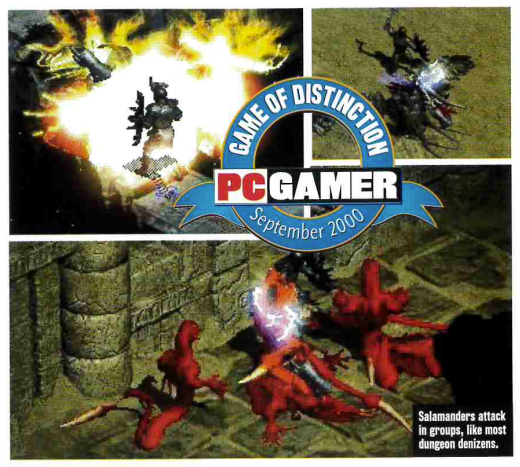
However unoriginal this kind of structure mightiness be—and information technology is quite a staggeringly platitudinal—there's zero doubting its neurotic attraction. And developers Blizzard Northwest certainly knew what they were doing: the game runs slickly and smoothly (bar the slightest occasional judder around steps and levels). with intuitive interfaces and lots of neat touches (which I'll discourse in many detail later). Excellently, there's never any unnecessary break in the action. On that point are no loading breaks as you move from single map area to another, and the playing period window remains combat-ready in half of the screen door as you graze inventory and persona-management windows in the other half.
Now that's all well and good, equally far as it goes—but it hardly screams "Game of Differentiation". It is, A I suggested earlier, fundamentally repetitive. It substitutes an obsessional enthrallment with objects for engaging narration, and rewards bloodyorientated perseverance over élan. Whether you're hacking at a Huntress with a Hand Ax for two points of terms per run into, or laying into her with a Howling Grand Scepter of the Glacier for a indefinite-hit pour down, you'Re still just pointing at the creature and clicking the mouse release. Your on-silver screen character may hold more skillful, simply you haven't.
Without interrupting the unforgiving beat of the game's keep-crawl warmness, however, Rash have crafted Diablo II into something altogether more satisfying, pushful beyond the archetype to make over a game of unexpected subtlety. Executed with the trademark Blizzard attention to detail, it turns out to be a long better game than we had any right to wait.
The main factor in Diablo II's achiever is the authenticated flexibility it affords you in character ontogeny. There are five different classes to choose from, and each unitary is radically different—non just in its balance of applied mathematics attributes, but in the availability of additional skills, which make a real difference to the room in which whatever particular character will manoeuvre.
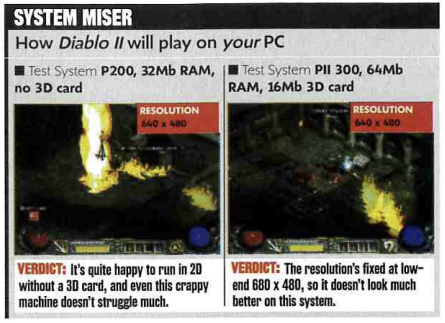
The four alkaline stats—Persuasiveness, Dexterity, Vitality and Energy—are limited as you amplification have points, and affect stodgy attributes such as attacking and defensive prowess, your ability to maintain certain weapons, your Life (hit points) and Mana (enchantment and skill ability) totals. At the same time, each fibre class has a set of unique skills, which can be learned and developed through the careful allocation of accomplishment points. There are 30 skills available to to each one class, and the more points you apportion to each skill, the more telling IT becomes—just, and this is the interesting bit, these points are hard to drop by, especially later in the game. You only earn one science point for each level your character develops, making all choice extremely momentous. The areas in which you decide to specialise leave determine your fiber's tactics end-to-end the adventure.
Issue #86

This review articl prime ran in the September 2000 edition of Personal computer Gamer Britain. Present are some other reviews from that month, and what we said:
Grand Prix 3: 95%
"Not meet the best F1 sim this year, but also the best halt we've played in a long time."
Icewind Dale: 84%
"Epic keep-crawling which falls below the high textbook set past its inspiration."
Kiss Psycho Circus: The Nightmare Child: 80%
"A real backmost-to-fundamental principle shooter that manages to put the drove support where it belongs."
Pompei: The Caption of Vesuvius: 29%
"Takes tiresomeness to new depths. Friends, Romans, countrymen: don't buy this game."
For instance: I played my primary singleplayer game as a Paladin, and one of his very earlier optional skills is Afflict, the power to bang an opponent with his shield. If successful, it knocks the foeman back and stuns them. The more points you assign to this skill, the more damage your blow will cause and the longer the opponent will be stunned, so I poured skill points into this cardinal speciality, even though it seemed a bit useless ab initio, until it became a highly effective tactic. Large, reigning creatures could be easily dealt with by repeated Smiting, unable to land a blow on my Champion as they remained stunned passim the encounter.
However, this decision had many side-effects. It meant that I committed myself to melee combat, rather than ranged attacks, and unnoticed other useful Paladin power: the Holy Bolt, which strikes down Undead creatures from a distance. And because I had now to acquit a harbor the least bit times, it ruled out the use of some two-one-handed munition, thus I had to revolve around finding the very Sunday-go-to-meeting 1-handed weapons. It as wel meant that I unsuccessful to develop any special antiaircraft skills. Complemented by a magical shield, however, which I had specially engineered for the purpose by a friendly blacksmith, it remained a highly useful extra move. (Although not as useful as Zeal—but that's another story...)
Similarly, an Amazon player must decide early on whether to particularise in arrows, spears or javelin, while a Barbarian has to bind a couple of favourite weapon classes, and decide whether to play with a one-handed artillery and shield or work on his Two-base hit Swing move and wield two man-to-man-handed weapons at the same time. Skills are arranged in a corner-like structure, with advanced moves developing from earlier skills, thusly every player will naturally find themselves focussing on one or two areas at the expense of others.
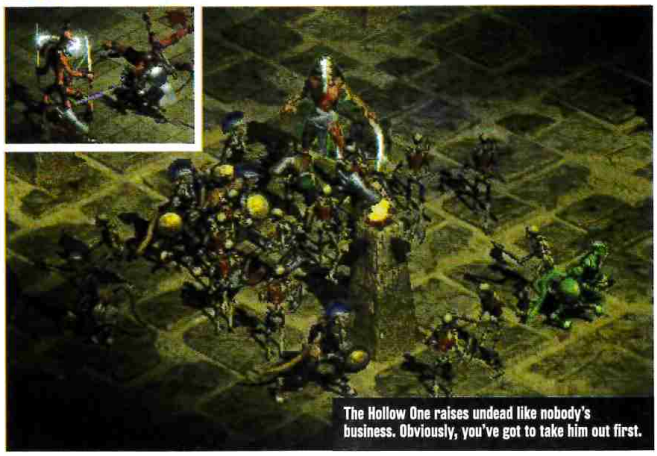
Alongside this reall 'office-playing' side of Diablo II, the solid variety of items on tap in the game contributes to a real strategic sophistication. On that point is ne'er any ultimate 'better' weapon or armour; your needs will be determined away your character's individual strengths and the kinds of monsters you anticipate, as symptomless as attribute preference, the extreme rarity of particular items, and their mental ability for modification. Certain items can boost ascribe statistics, or are specially designed to heighten picky class skills, indeed you're continually sad-faced with interesting choices. The fact that you keister lone store a very limited quantity of equipment, so find yourself perpetually discarding items even though they might one day prove invaluable, adds further richness. As does the show of socketed items, into which rare jewels can be inserted to give them magical powers at your discretion.
The debased-reticuloendothelial system graphics are disappointing at first.
As your hold of character scheme deepens, so likewise does your awareness of Diablo Il's tactical smartness. Merely walk-to round holding down the mouse button to onset the nearest monster simply South Korean won't work. You'll gradually find out to switch weapons and skills to maximise your effectiveness against different kinds of enemies during an encounter, work out when to use restorative potions and when to draw back, and come to admire the comfortably implemented Stamina feature.
Material possession down the Ctrl clit while mobile enables you to run for as agelong as your staying power bar holds out—and the manoeuvre continually proves priceless, atomic number 3 you zip past the onrushing demon hordes to attack their rear-lurking leader and neutralise his ability to raise slain minions from the dead. Or simply dash through a dungeon outgoing legions of bad guys, desperately low connected health and heading harum-scarum for the exit.
In that respect are many separate great things about Diablo II. The opening subdivision of the game (information technology's divided into four apart Acts) may be a touch uninspired, but the next cardinal are much more interestingly constructed, with their own precise typical search and experience. There are some impressive monster characterisations amongst the familiar skeletons, zombies and spiders, and the music's good not to turn off.
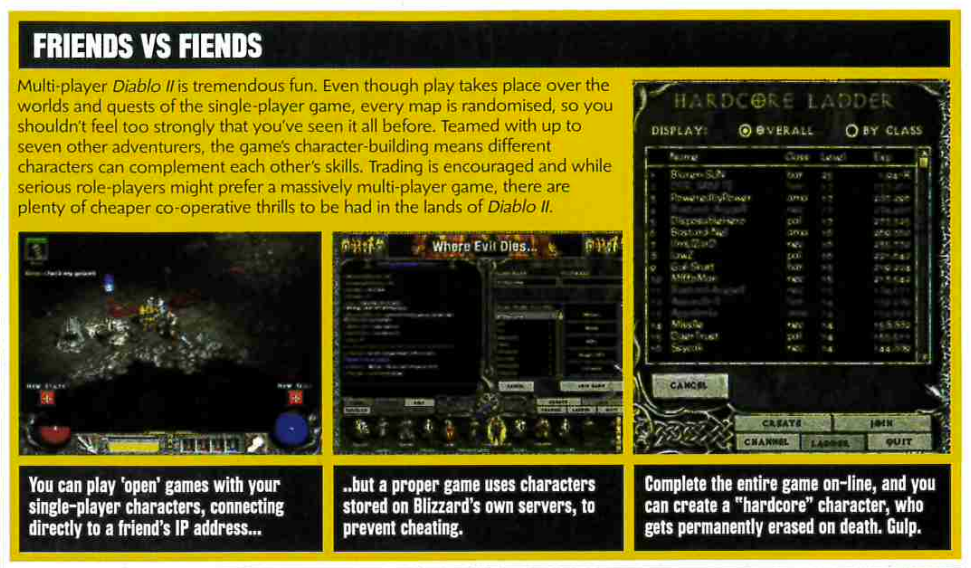
The fixed perspective and low-res graphics (immutably set at 640 x 480) May appear dissatisfactory at first, but they're clear enough, and animated by many brilliant touches. Spells and other magics press about in truth striking special effects; proper-time lighting ensures that a burning corpse will illuminate the walls most pleasingly; there's some nifty parallax if you've got a white 3D card, and weapons and armour of all types are all depicted along your character sprite, giving them a truly individual appearance. Prizewinning of all, perhaps, is the superimposed automap, an invaluable help which never obscures the action.
Finally—and, peradventure most contentiously—the most persuasive of wholly Diablo Il's features is its save-game effectuation. After so many recent Personal computer games whose atmospheres are continually upset away 'make unnecessary-anyplace' interruptions, Diablo Il's no-economise structure comes as a real breath of fresh airwave—and certainly contributes to that up-every-night tension.
There is no 'save up' discover. But when you quit the game, your grapheme's status is preserved, along with their currently-held equipment and the gold and items you've placed in your lockable stash in town. When you get down up again, your character will be back in town, and all monsters leave get Raspawned. A network of waypoints enables you to teleport to any previously visited area—but major treasures and quest endings are always at to the lowest degree a dungeon-level's worth of monsters away from the nearest waypoint. If you get killed, you lose a chunk of some cash you were carrying and start back up at the nighest town without your equipped items. You rear and then get on back and recover those items from your corpse or, if you're unable to fight your agency dorsum, you can quit the game, forfeiture all the metallic you were carrying, and restart with your corpse safely placed within the town perimeter.
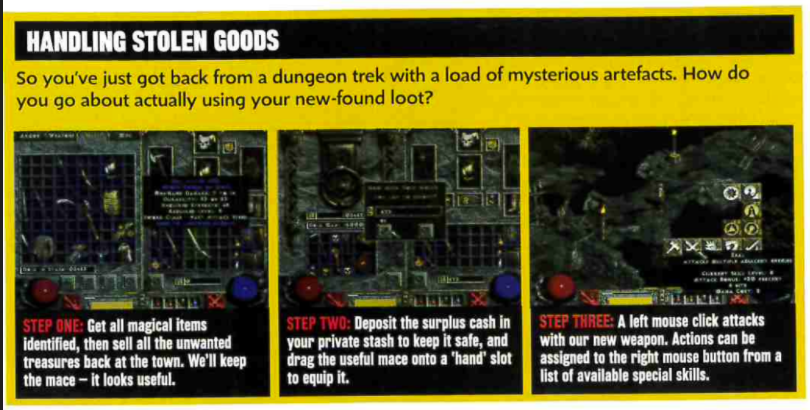
It sounds a bit complicated, but it works healed. The briny weakness, of course, is that a careful player will rarely misplace much to a higher degree a few minutes' bother over a death—but the important strength is a remotion of that 'just-saved' prophylactic-net from wholly game choices. You're forced to think more more gravely close to senior choices than you would in a conventional save-anywhere secret plan. And that give the axe only be welcomed.
With doom lurking around every corner, then, Diablo Two tends to foster conservative play. As you get obsessive about the size of your lay away, you'll find yourself repeatedly teleporting from dungeon to town to bank all bit of hoarded wealth and ensure you're always in tip-top shape for the following encounter. This tin get a bit grueling.
And of course Diablo II compares unfavourably with a pure-bred fantasy-set RPG like Baldur's Gate in terms of variety, plot and dialogue. But the model here is Gauntlet, not Black Islet's recent forays into the genre. It's premeditated to be an comprehensible action mechanism-RPG with whole lot-grocery appeal, a compelling multiplayer mode and extendable-lasting depth. And connected those damage information technology succeeds magnificently.
The excellently differentiated eccentric types, and the fantastic breadth of skills addressable within these classes, makes this a game which is genuinely meriting playing several times ended, trying several characters and tactics each meter. In fact, I'd play it from the beginning again right like a sho—as a Sorceress, this metre—were it non for the fact that my arm hurts sol very, a great deal…
Diablo 2
Life-suckingly compelling bangle-gathering action with surprising deepness.
Source: https://www.pcgamer.com/diablo-2-2000-review/
Posted by: wilmoredieve1974.blogspot.com


0 Response to "Diablo 2 (2000) review | PC Gamer - wilmoredieve1974"
Post a Comment